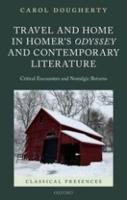
OUP (2019) h/b 164pp £60.00 (ISBN 9780198814016)
This book is an interesting addition to the ‘Classical Presences’ series, which has so far mostly published works on modern reception of the Classics, exploring how the Classics have been used in contemporary cultures. D.’s book belongs more to the domain of Comparative Literature, which offers different ways of approaching the Odyssey through a succession of comparative readings with five modern novels which are not directly influenced by the Odyssey, but share with it the themes of travel and home. D. characterises her approach as ‘a kind of improvisatory interpretive experiment’ which itself echoes Odysseus’ own aspect as ‘improviser’, who always ‘tries out’ different approaches to people and situations that he encounters and is able ‘to change, to adapt, to improvise a new sense of what it means to be Odysseus in this new world—at home as well as in his travels’. (Introduction, p. 6) The resulting book produces ‘some new and surprising conversations’ (p. 16).
The first three chapters—namely Chapter 1 ‘More like Odysseus’: Playing House in Michael Ondaatje’s The English Patient, Chapter 2 ‘An end to housekeeping’: Mobility and Domesticity in Marilynne Robinson’s Housekeeping, and Chapter 3 ‘It’s okay’: Improvisational Housekeeping in Cormac McCarthy’s The Road—deal with the overarching theme of how the protagonists improvise temporary homes in new and unfamiliar situations and how they respond to the ‘challenges of mobility and the allure of home’ (p. 18). For example, in the case of Ondaatje’s 1992 novel The English Patient, D. focuses on the way the four main characters improvise and make the bombed out Italian villa their temporary home in the last year of WWII. D. argues that its comparison with the Odyssey draws our attention to the significance of the domestic nature of Odysseus’ experiences abroad and that it is the time he spent with Calypso, Circe and among the Phaeacians that rehabilitated and enabled him to return home (p. 32)
The following two chapters—Chapter 4 ‘This house is different’: Forgetting the Way Home in Rebecca West’s The Return of the Soldier and Chapter 5 ‘Come brother. Let’s go home’: Restorative Nostalgia in Toni Morrison’s Home—deal with the ‘complexities of coming home again’ (p. 18). West’s 1918 novella tells the story of an English soldier who has lost the memory of the past fifteen years of life, including that of his wife, after suffering shell shock while serving in WWI and prefers to live in the past in a fantasy world with the girlfriend of his youth (p. 18). D. argues that his amnesia prompts us to rethink the time that Odysseus spends with Calypso as ‘a necessary escape from reality that enables rather than prevents his eventual return home.’ (p. 18). Morrison’s 2012 novel, Home, tells another story of a soldier, who, like Odysseus, comes home to a strange house due to his long absence and needs to adjust to the demands of domestic life where nostalgia has a positive restorative effect. D. explores the concept of nostalgia further in the concluding chapter.
I can imagine this eminently readable and thought-provoking book would be a useful teaching resource for Comparative/World Literature as well as Classics. The only unfortunate slip that I have found is that the land of the Phaeacians is called ‘Phaeacia’ rather than ‘Scheria’ in the concluding chapter.
Naoko Yamagata
